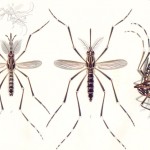by Catherine Haug, July 22, 2013; updated May 25, 2015
(Image, right, from Wikimedia Commons)
It’s that season again – mosquitos. At a recent Riverbend Concert in Bigfork, people were liberally spraying their skin and clothing with mosquito repellant, most likely containing DEET. Although I tried to avoid the spray, the wind didn’t play fair and blew some my way just as I opened my mouth to say something to a neighbor. I breathed in a gulp of the spray that led to a bad headache lasting over an hour.
Natural repellants
Mosquitos don’t usually bother me, probably because I’ve never had a shortage of thiamin (vitamin B1) in my system; this vitamin is a natural bug repellant. I consider myself lucky, but anyone can benefit from this miracle by taking a daily dose of thiamin during mosquito season (May through October in our area).
You can also find natural repellant products on the market, made from botanical oils such as soybean oil, cinnamon leaf oil, citronella oil/soap, lemongrass oil, peppermint oil, catnip oil, castor oil, eucalyptus oil; also clear liquid vanilla extract mixed with olive oil. (1,3,5). Caution: Don’t go overboard with the use of essential oils – a tiny bit goes a long way, and too much “could cause skin irritation or another reaction.” (5)
Or make your own (see references 5 and 6 for recipes using essential oils or the oils from dried herbs). For example, use for a small batch (5):
- 10-25 drops (total) of essential oils (see list above)
- 2 tablespoons of a carrier oil (such as olive oil) or alcohol (such as vodka)
2015 update: Mercola (7) offers a new recipe (originally from Backpacking Spirit (8)):
“Make your own mosquito repellent consisted of around 10% lemon eucalyptus oil. If you are using the essential (‘pure’) oil, note that it does not mix with water and will therefore require a carrier oil, such as [hazel or olive oil, or alcohol such as vodka].
Procedure:
- Obtain an appropriately sized bottle for travel; a 100 to 200 ml bottle will be a good choice. You may also go for a bottle that has a spritzer nozzle for easy application.
- Choose your carrier oil
- Use a measuring jug for more precise measurements.
- Think 10% essential oil. If you are using a 100 ml bottle, mix 90 ml of your chosen liquid and 10 ml of lemon eucalyptus oil. If you are using a 200 ml bottle, mix 180 ml of liquid and 20 ml of essential oil.
- Shake the bottle thoroughly before use.
- Spritz onto skin and rub in.”
Read on for more about the harm of commercial insect repellants.
Commercial Repellants:
The harm of DEET
Mercola advises against DEET, citing what a pharmacologist at Duke University Medical Center discovered (1):
“Prolonged exposure to DEET can impair cell function in parts of your brain — demonstrated in the lab by death and behavioral changes in rats with frequent or prolonged DEET use. Children are particularly at risk for subtle brain changes because their skin more readily absorbs chemicals in the environment and chemicals more potently affect their developing nervous systems. Other potential side effects DEET exposure include: memory loss, headache, muscle weakness and fatigue, shortness of breath, muscle and joint pain, and tremors.”
MedlinePlus warns that “DEET is especially dangerous for small children. Seizures may occur in small children who are consistently exposed to DEET on their skin for long periods of time.” (2)
The harm of permethrin
DEET is not the only chemical in bug spray to avoid. From Mercola (1):
“Another potentially harmful chemical found in many bug sprays is permethrin. This chemical is a member of the synthetic pyrethroid family, all of which are neurotoxins. The EPA has even deemed this chemical carcinogenic, capable of causing lung tumors, liver tumors, immune system problems, and chromosomal abnormalities. Permethrin is also damaging to the environment, and it is particularly toxic to bees and aquatic life.
It should also be noted that permethrin is highly toxic to cats. … Even a few drops can be lethal to your feline pet.” [NOTE: The red text is my own emphasis, as I am a cat lover.]
For more on permethrin and related chemicals, see National Pesticide Information Center: Permethrin: General Fact Sheet (4)
References
- Mercola: How to Prevent and Treat Insect Bites Without Harsh Chemicals
- Medline Plus: Bug spray poisoning
- NaturalNews.com: Chemical Mosquito Repellant DEET Causes Neurological Damage, Gets Absorbed Through The Skin and Insect repellent DEET is toxic to brain cells
- National Pesticide Information Center: Permethrin: General Fact Sheet
- Chemistry.about.com: Natural Insect Repellent Recipe
- Wellness Mama: Homemade Natural Bug Spray Recipes That Work!
- Mercola: This Natural Bug Repellent Works Better Than Deet
- Backpacking Spirit: Homemade Mosquito Repellant
